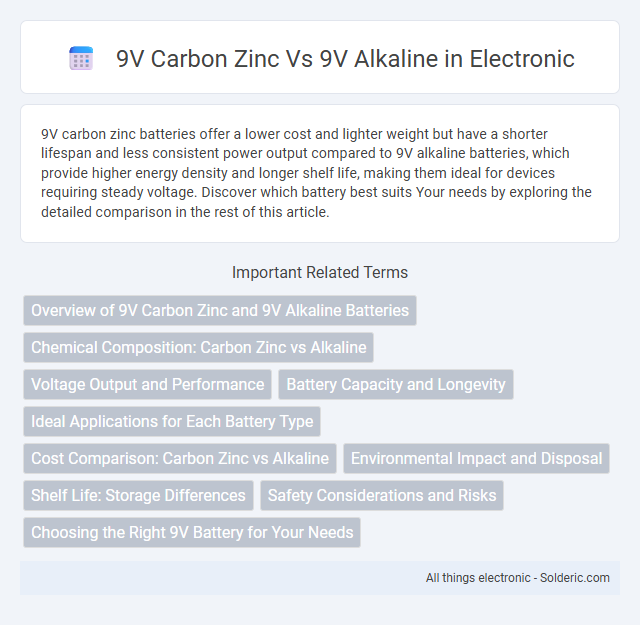9V carbon zinc batteries offer a lower cost and lighter weight but have a shorter lifespan and less consistent power output compared to 9V alkaline batteries, which provide higher energy density and longer shelf life, making them ideal for devices requiring steady voltage. Discover which battery best suits Your needs by exploring the detailed comparison in the rest of this article.
Comparison Table
| Feature | 9V Carbon Zinc Battery | 9V Alkaline Battery |
|---|---|---|
| Voltage | 9 Volts | 9 Volts |
| Capacity | Approx. 400-600 mAh | Approx. 550-600 mAh |
| Energy Density | Lower | Higher |
| Cost | Lower | Higher |
| Shelf Life | 2-3 years | 5-7 years |
| Performance | Best for low-drain devices | Suitable for high-drain devices |
| Leak Tendency | Higher risk | Lower risk |
| Environmental Impact | Less toxic metals | More eco-friendly with less waste |
Overview of 9V Carbon Zinc and 9V Alkaline Batteries
9V carbon zinc batteries feature a zinc anode and carbon rod cathode, offering an affordable power source with lower energy density and shorter lifespan compared to alkaline variants. 9V alkaline batteries utilize zinc and manganese dioxide chemistry, delivering higher energy output, longer shelf life, and better leakage resistance for devices requiring reliable performance. Your choice between 9V carbon zinc and alkaline depends on balancing cost-effectiveness with the need for sustained, high-capacity power.
Chemical Composition: Carbon Zinc vs Alkaline
9V carbon zinc batteries use a zinc anode and a manganese dioxide cathode with an acidic electrolyte, resulting in lower energy density and shorter lifespan. 9V alkaline batteries contain a zinc anode and a manganese dioxide cathode as well, but use a potassium hydroxide electrolyte, providing higher energy output and longer shelf life. Choosing between these depends on your device's power demands, with alkaline offering better performance for high-drain electronics.
Voltage Output and Performance
9V alkaline batteries typically provide a more stable voltage output around 9 volts during their lifespan, ensuring consistent performance in high-drain devices. Carbon zinc 9V batteries often start near the same voltage but experience a quicker voltage drop, leading to reduced efficiency and shorter runtime. You will notice longer-lasting power and better reliability with 9V alkaline batteries in demanding electronics.
Battery Capacity and Longevity
9V alkaline batteries typically offer higher capacity and longer lifespan compared to 9V carbon zinc batteries, making them more suitable for devices with moderate to high power consumption. Carbon zinc batteries usually have lower capacity and shorter longevity, which can result in more frequent replacements and higher overall cost in the long run. Choosing a 9V alkaline battery ensures your devices run more efficiently and require less maintenance.
Ideal Applications for Each Battery Type
9V carbon zinc batteries are ideal for low-drain devices such as remote controls, wall clocks, and basic smoke detectors due to their affordability and moderate energy capacity. In contrast, 9V alkaline batteries are better suited for high-drain applications like digital cameras, wireless microphones, and advanced smoke alarms, offering longer shelf life and higher energy output. Choosing the right battery type ensures optimal performance and cost-efficiency based on device power requirements.
Cost Comparison: Carbon Zinc vs Alkaline
9V carbon zinc batteries are generally more cost-effective upfront, offering a lower price point suitable for low-drain devices. In contrast, 9V alkaline batteries have a higher initial cost but provide longer-lasting power and improved performance, making them more cost-efficient in the long term. Consumers seeking budget-friendly options may choose carbon zinc, while those requiring durability and reliability often invest in alkaline variants.
Environmental Impact and Disposal
9V carbon zinc batteries have a higher environmental impact due to their shorter lifespan and more frequent disposal, contributing to increased waste and resource consumption. 9V alkaline batteries, while more efficient and longer-lasting, still require proper recycling to prevent heavy metals such as mercury and cadmium from contaminating soil and water. You should always follow local regulations for battery disposal to minimize environmental harm and support sustainable waste management practices.
Shelf Life: Storage Differences
9V alkaline batteries typically offer a shelf life of 5 to 7 years, maintaining their charge longer in storage compared to 9V carbon zinc batteries, which usually last about 2 to 3 years before significant capacity loss. Alkaline batteries have lower self-discharge rates, making them more suitable for long-term storage in controlled environments. Carbon zinc batteries perform better in short-term applications but require more frequent replacement due to faster degradation during storage.
Safety Considerations and Risks
9V carbon zinc batteries pose a higher risk of leakage due to their acidic electrolyte, which can cause corrosion and damage to devices if mishandled. 9V alkaline batteries offer improved safety with a more stable alkaline electrolyte, reducing the chance of leaks and providing better long-term reliability in electronic devices. Both types require proper storage and disposal to prevent potential chemical exposure and environmental harm.
Choosing the Right 9V Battery for Your Needs
Choosing the right 9V battery depends on device power requirements and usage frequency. Carbon zinc 9V batteries are cost-effective for low-drain devices like smoke detectors, while 9V alkaline batteries provide longer-lasting, reliable power suitable for high-drain electronics such as wireless microphones and portable radios. Understanding battery chemistry and performance ensures optimal device functionality and cost efficiency.
9V carbon zinc vs 9V alkaline Infographic

 solderic.com
solderic.com